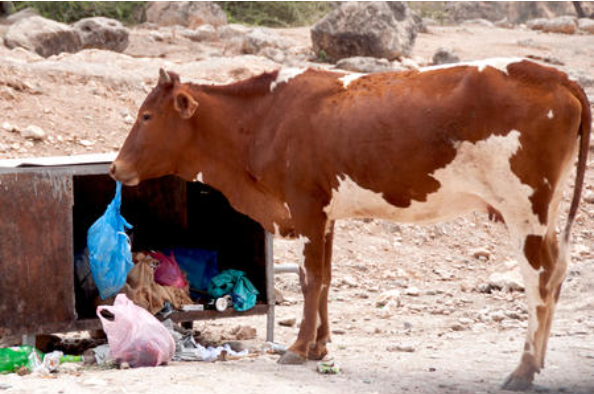
A few months before the rise of the covid 19 pandemic, while driving I saw something that touched me deeply. That scene is still fresh in my memory.
I saw a small heap of garbage on the roadside, mostly black colour, a few green colours, and few other plastic shopping bags were lying there filled with household waste like vegetable peels, tea leaves, and another leftover food waste and a cow was trying to eat that stuff. I saw that this cow ingested a plastic bag along with the food inside it. Before I could park my car & cross the road..it gulped a couple of more bags! This incident was upsetting. Though I had heard a lot about the same incidences many times seeing it in front of my eyes, gave a different perspective to the entire situation.
Over the next few days, I tried to find greener alternatives to the plastic garbage bag, and that’s how my research began. The more I searched the more I found the truth about alternatives to plastic bags available in the market.
There is this plastic bag being sold as a green alternative with the term“oxo-biodegradable”, I found out that it is nothing but a plastic bag with artificial additives that do not biodegrade but merely fragment into small pieces called microplastics. These microplastics remain in our environment forever. They are now in our food, water, and air and unknowingly we all are ingesting them every day! I felt cheated as a consumer & as a citizen. At the same time, it reminded me of Newton’s third law which is- Every action has an equal and opposite reaction!!!!!!! The plastic we are throwing into the environment is coming back to us.
Bioplastic bags made with vegetable starch are often touted as being eco-friendly, but do not they live up to the hype? A 2010 study from the University of Pittsburgh found that it wasn’t necessarily true. The researchers determined that bioplastics production resulted in greater amounts of pollutants, due to the fertilizers and pesticides used in growing the crops and the chemical processing needed to turn organic material into plastic.

Newspaper bags cannot be used for wet waste and the ink used in a newspaper is toxic. Throwing too much newspaper in the environment won’t do any good.
In India, liquid food items are generally served in single-use bowls made with natural leaves during mass feasts. Post usage these soiled bowls & plates are dumped in pits and within few months they turn into good compost, thus making the soil more nutrient-rich. This liquid retaining & 100% compostable quality of the siali creeper leaf plates led to the idea of making a truly natural trash bag. People around me loved this idea but I needed more solid validation. Moreover, there was a lockdown in the country due to the outbreak of the pandemic. Coincidently at the same time, I got an opportunity to enrol for the women startup program 2020 by NSRCEL, IIM, Bangalore. And voila! the idea was selected for incubation !!! That’s when I began developing this Green Bag.
My family and friends would often ask me, why am I doing so much hard work. My answer to them is that I am trying to do my bit for people & mother nature.
From ethical sourcing to generating livelihoods to enabling composting at the end of life, the Green bag is a promise of a sustainable value chain.








You must be logged in to post a comment.